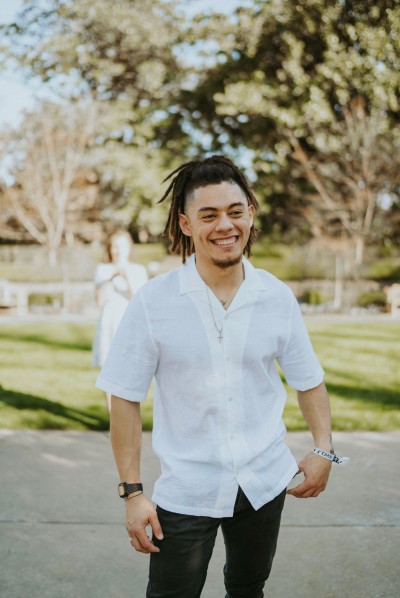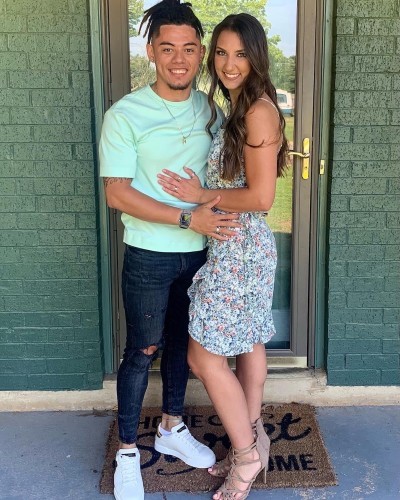By Nicole Alcindor, CP Reporter | The Christian Post Franklin Hodge is a devout Christian living in Dallas, Texas. | Courtesy Lance Rhodes/Lance & Liz Photography
Franklin Hodge is a devout Christian living in Dallas, Texas. | Courtesy Lance Rhodes/Lance & Liz Photography
Born to a community in El Salvador where heavy crime and gang violence was the norm, the 25-year-old says that he suffered from many dark and traumatizing experiences during his childhood and adolescence.
As a baby, he was abandoned by his parents and left to live with family members who sexually abused him starting at age 3, continuing for many years that followed.
He witnessed countless people he loved murdered in front of his eyes. He also saw friends he played with as a boy kidnapped from their front yards.
His adolescence could be described in one word: darkness.
Feeling as though he had no support or true love in life, he began to look for both in all the wrong places.
"At age 9, I joined a gang in El Salvador," he told The Christian Post in a recent interview.
"I saw that they were united. I saw that they had power. I saw that they had money. I saw that people were afraid of them and that they were respected in a way, and all that seemed really appealing."
For about a decade, Hodge was active in a gang. On multiple occasions, he was caught with illegal weapons or illegal possession of drugs. As a result, he spent many years in and out of prison.
Fleeing on foot
As time progressed, Hodge said things continued to get darker and more dangerous in El Salvador. He began to fear for his life as he continued in the gang.
To run from danger at around age 16, Hodge fled with a few of his friends to escape El Salvador. Together, they traveled by foot to the United States for safety.
"I crossed the borders of El Salvador and Guatemala, Guatemala and Mexico and Mexico and then to the U.S. by foot. I crossed rivers swimming. From the moment that I left my hometown, I was on a bus, and then the bus stopped near the river, and I had to get out and swim across the river. And then, I was always getting into trucks, jumping off trucks, walking, hiking mountains, or swimming in rivers or walking through the forest or running. Every day I was either walking, I was running, or jumping into trucks and jumping out of trucks."
He estimated the journey took around a month and a half, though he admitted difficulty recalling the exact duration.
"We had men that were helping us along the way and leading us. When we got to Guatemala, we had someone lead us through Guatemala. We had somebody else lead us through parts of Mexico," he said.
"There were times when they just threw us in the forest, and they were like, 'Alright, you're supposed to go this direction.' And we had to just go. We would just start walking, and we would walk for literally five to six hours without knowing if we were even walking in the right direction or not. We didn't have water or food."
"I'm here. I'm in the U.S. now. So I was walking in the right direction. But, in the moment, it was like, 'I don't even know where I'm going to go.'"
Upon arriving in the U.S., immigration authorities detained him in Corpus Christi, Texas. With no living parents to return to, he was placed in a foster care program in Dallas, Texas, due to his minor status.
Hodge's first foster family was Catholic but not particularly devout. While they showed him love and care, he struggled to accept it, having never experienced genuine familial affection in his past.
Not knowing how to love or be loved
In 2014, Hodge left his foster family and was missing for five months. When found, he was placed with a deeply religious Christian family.
"From the moment that I met them, I knew there was something different about these people. I had come across so many people of all kinds. But, these people are the first ones that I got, and I was like, 'OK, they are different,' And I was wondering why," Hodge recalled.
"It was because of the Gospel. They believed the Gospel. They knew the Gospel. They lived out the Gospel. And so, from the moment that they took me in, they took me to church. I didn't understand the language, but they still took me to church," he added.
The family also introduced him to the significance of the dinner table as a sacred space for the family to gather, converse and bond. He noticed their consistent Christian practices, like praying before meals.
"They would always pray. They would do all the things that we do as Christians, that I do as a Christian now. But, at that time, I didn't know any of those things," Hodge said.
"They were the ones that introduced me to the Gospel. And that was the cool thing about it. Because we didn't even speak the same language. And that's what the Gospel is about. We should live the Gospel to the point where from the moment that we come into any room people should notice that we're different because we are a temple of the Holy Spirit," he continued.
"The family just lived it. They didn't need words to show me what God did for me. They just knew it. They took me to church all the time."
Believing in Christ but not fully accepting Him
[Sponsored] THE HILL Official Trailer | In Theaters Starting August 25
Unmute
Duration 0:30
/
Current Time 0:11
Advanced Settings
FullscreenPlayUp Next
In 2019, when Hodge was 20, his foster family enrolled him in high school. As an adult attending school with teenagers, he felt out of place and frequently got into altercations, grappling with the anger stemming from his traumatic past.
One evening, overwhelmed by his emotions, Hodge felt he reached his lowest point and was brought to tears. With the support of his foster family, they guided him through a sinner's prayer. That day, Hodge accepted Jesus Christ into his life.
"I was in the living room, and I was in tears. I literally hit rock bottom at that time. And they shared the Gospel with me. I was broken. I needed help and everything, and I ended up accepting the Gospel in 2019. I got on my knees and prayed to accept Him," Hodge said.
Even after this spiritual acceptance, Hodge confessed that he found it challenging to fully trust in God. His past traumas left him wary, making it difficult for him to trust anyone, including God.
Living for partying, money, fame and sex
In high school, Hodge found his niche on the competitive fighting team. He discovered his natural talent in combat sports, allowing him to graduate a year early.
Later, a professional MMA team from Colorado scouted him.
"I moved to Colorado for a while and I began kind of like a career as a professional MMA fighter and that's kind of where I would say I started drifting away in my life because of money. Like I started making money. Fame started coming into my life. I was recognized in places that I went to," Hodge said.
"It was a weird transition. Literally coming from a background where I literally had nothing. I mean, I went days without eating and to get my food I sometimes had to literally go and kill wild animals and cut them up to eat and survive," he continued.
"I went through all that, came here, went to a family, and I started being taught how to be in a family. Then, I graduated high school, and I'm introduced to this world of money and fame and kind of getting what I wanted."
This newfound fame, however, rekindled old vices he'd been exposed to since he was 9 — indulging in relationships, smoking and frequent partying.
"I started living for people. I started seeing how other MMA fighters would act, and I adapted those behaviors and lived that way," he said.
Between 2017 and 2020, Hodge was deeply immersed in the MMA world, sidelining his faith. At the same time, he grappled with Post Traumatic Stress Disorder due to the extensive abuse he had experienced from a young age. He wrestled with depression, anxiety, bitterness and an inability to forgive those who wronged him, including his parents and the relatives who abused him in El Salvador.
"I was spending literally weeks at a time not being able to sleep because of my PTSD. That's when I got to a point where I started doing dumb things. I started mistreating my [foster] parents and stealing money from them. Even though I was making money but, I was stealing money from my parents to help my people back in El Salvador," Hodge recalled.
Finding God again
One evening in late 2019, filled with remorse, Hodge admitted to his foster parents that he had been stealing from them. Rather than rejecting or dismissing him, his foster parents responded with compassion.
"They didn't reject me. They didn't push me out. They didn't say, 'You're the adopted one,' and walk out. They loved me. They cared for me. They showed me the Gospel again," Hodge said.
"My parents said, 'Hey, we know that you're doing all this and therefore, there's going to be consequences. But we love you. We care for you. You are our kid. And we have chosen you.' I was kind of ready for them to reject me, for them to throw me away, so I could go turn around and go kill myself," Hodge said.
"They did the whole opposite. That's when my mom shared the Gospel with me and she said: 'Hey, this is what the Lord has done for you and He loves you.' And at the end of the night, I was like, 'Alright, if you say that that's the way, then I want it. That's when I truly accepted the Gospel.'"
Embracing God's healing
After his profound realization, Hodge grew more connected to God and the teachings of the Gospel.
He became a regular at his local church and enrolled in a recovery program there, which helped him address and heal from his past traumas, ultimately guiding him toward forgiveness.
Although he affectionately refers to his foster parents as "mom" and "dad," Hodge has recently reconnected with his biological mother. He forgave her for her earlier absence, and they have since forged a stronger bond.
 Franklin Hodge and his soon-to-be wife, Meghan | Courtesy Lance Rhodes, Lance & Liz Photography
Franklin Hodge and his soon-to-be wife, Meghan | Courtesy Lance Rhodes, Lance & Liz Photography
Embracing his newfound faith, Hodge established an online ministry via Instagram and completed a year-long evangelistic seminary course.
Hodge is about to take on two new roles: he's training to be a commercial pilot and will soon marry his fiancée, Meghan, on Aug. 19. They met at church, and he calls her "a gift from God's outpouring of blessings" on his life.
"Jesus changed my life," he said. "Now, all I want to do is to dedicate my time to sharing the Gospel literally anywhere: in coffee shops, where I go eat or in the streets or with people that I interact with and with different juveniles and in the prison systems."
Nicole Alcindor is a reporter for The Christian Post.